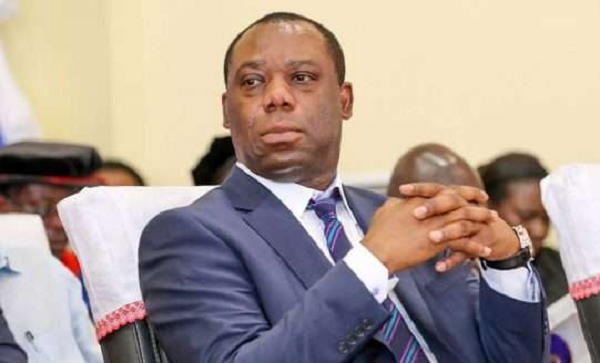
Some core global competences for the 21st century - Quality education and teachers for a transforming world
It was insightful listening to Conrad Hughes - on Skype from Geneva - contribute as a panellist to the Tema International School (TIS) Educational Forum, Monday October 1, 2018, on the theme, “A Transforming World: The State of School Education in the Next 15 Years”.
Other perceptive practitioners for the forum included Dr Fatma Odaymat, principal of Al Rayan International School; Mr Israel Titi-Ofei, principal, SOS Hemann Gmeiner International College; Ms Ida Abbeyquaye, Ghana International School (GIS); and yours truly.
The following Wednesday, I had the honour of delivering the keynote address on the theme for celebrating Teacher’s Day, “The right to quality education means the right to a qualified teacher.”
Organised by the Ministry of Education (MoE) and the National Teaching Council (NTC), the event formed part of the activities marking the 2018 Ghana Teacher Prize that sought to acknowledge some well-performing teachers in the country.
I noted that Lifelong Learning must incite the responsibility and pride of every teacher everywhere. These days internet sites that showcase best practices worldwide provide the greatest opportunity and the joy of advancing to be the very best one could possibly be in every notable profession including, of course, teaching.
Citing my own example - at the ripe age of over three score and ten - learning has become so much easier and exciting; and must be especially so for younger practitioners who ought to be savvy to perform in today’s digital world.
The initiative for licensing teachers empower practitioners to scale to greater heights and earn the confidence and respect impressed from one’s continuous intellectual and practical growth.
In the address, I urged the professors and lecturers of the nation’s colleges of education that teacher trainees ought to taught mostly at the school sites where the children are.
How possible is it to inspire, lead, groom, coach, practice and mentor future education practitioners in the solitary confinements of theoretical lecture halls? Let’s think and act about that very seriously!
At the TIS Educational Forum, Conrad Hughes cited the seven core global competences that one should be thinking of in developing themselves as learners, and/or as a school thinking of developing learners.
These have been established by UNESCO’s International Bureau of Education (IBE) with a 195 member states, and are:
The first global competence is Lifelong Learning. We want students to be learning throughout their lives – to be learning animals because if you are not upgrading, up-skilling, constantly challenging yourself to become a learner, you would be outsourced by machine quickly.
Self-agency
Secondly, you need to show “Self-agency”.
That is, you take ownership of the learning process.
Learning is not something that happens to you but something you make happen. As Lao Tzu, the famous Chinese philosopher said many years ago, “When the student is ready, the teacher appears.”
What a beautiful philosophy of life, self-agency. Take advantage of whatever situation you have and make the best out of it.
Interacting with other people
The third competency is “Interacting with other people”: learning how to collaborate, how to work in a team, how to listen, to negotiate, to involve yourself in active, respectful dialogue.
Working together is increasingly important in the 21st century because the challenges we are facing need to be looked at from multiple perspectives, and through collaboration.
The fourth is “Interacting with the world”.
That means thinking about sustainability, our global footprint, the consequences of our actions on society and nature as a whole. We need to love nature, we need to work with nature, not destroy our planet.
It is so important that we interact with the world in a mindful fashion.
The world is not just a vacant stage for us to act on, it is an ecosystem and we are part of it so respecting the environment is a critical competence to develop and respect.
Interacting with diverse tools and resources
The fifth global competence is “Interacting with diverse tools and resources”.
This means interacting with intelligent systems, it means taking advantage of singularity, it is no longer about human beings using tools, it is about human beings interacting with tools and intelligent systems, and re-thinking what we can do to make the world a more peaceful place, a better place to live in through technology.
Trans-disciplinarity
That leaves us with two micro competences.
The sixth one is “Trans-disciplinarity”.
That means thinking beyond boundaries, thinking across subjects, making connections.
The wicked problems that humanity is facing today – wicked because they are difficult – can only be solved from multiple epistemic points, in other words, through different subjects and domains.
No singular domain is powerful enough to solve a wicked global problem.
Some of the most impressive designs in the 21st century, like a computer, can’t be harnessed and created by one framework alone, you need multiple frameworks to interact with each other so thinking across subjects is important.
Multi-literateness
The last one is “Multi-literateness”; that is being able to speak multiple languages, having a repertoire of different codes and references, understanding how to use technological literacy, financial literacy, scientific literacy, so you are a fluid communicator in a variety of different registers, with different people and systems.
These are the things that we need to be focusing on.
The writer is a trainer of teachers, and a quality teacher education advocate.
Email: anishaffar@gmail.com
Blog: www.anishaffar.org
